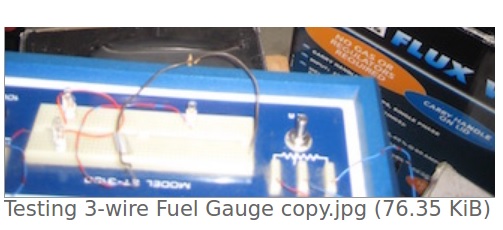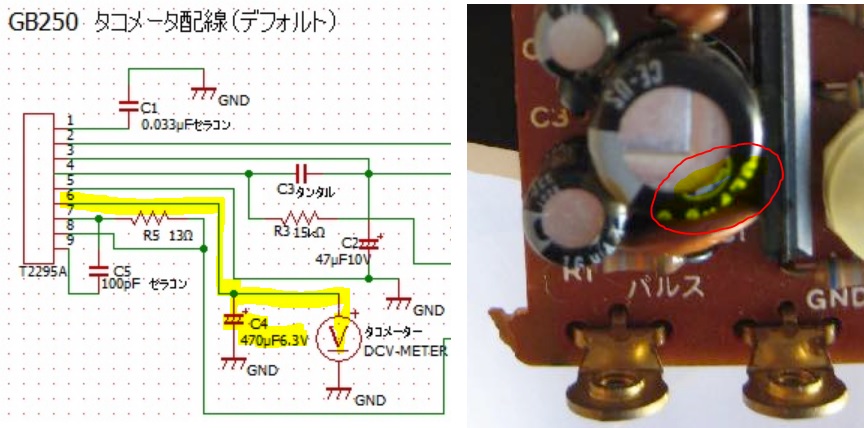Page 1 of 1
Tachometer Questions
Posted: Sun Jan 24, 2016 10:49 pm
by DavidB
The tachometer on my Honda Flush doesn't work leading me to the following questions.
1) Has anyone looked at the signal going to the tachometer with an oscilloscope?
2) Are pulses sent once per engine revolution?
3) Have you bench tested a tachometer and if so, what kind of signals did you generate to send to it?
I'll be working on the above and will report back. Thanks.
I was able to place an oscilloscope on the ignition signal to the tachometer. I could see 2000 RPM superimposed on the 60Hz noise in the garage as I failed to ground the battery ground to building ground, but you can see it.
Re: Tachometer Questions
Posted: Sun Jan 24, 2016 10:58 pm
by benji
Typically you hook up an after market tach to the negative side of the ignition coil. W a 2 stroke it will fire twice as often so I think any tach for a 2 cylinder 4 stroke should work. Go on ebay, there's literally tons of motorcycle/scooter tachs
Re: Tachometer Questions
Posted: Fri Jan 29, 2016 12:00 pm
by DavidB
I would like to get this original tachometer running again. Photo attached, taken when I was sending a signal to the fuel level gauge moving it back and forth from empty to full.
Re: Tachometer Questions
Posted: Sat Sep 05, 2020 11:17 pm
by DavidB
I found the schematic of the PCB that Honda put on the Flush in 1983. It is built around a chip that was used in several makes and applications of tachometers. I can't find any discussion regarding the chip, found it in Japanese at some web site. I used a square wave generator input to it and with DC positive and negative at the appropriate leads, got it to operate. It delivers 0-10 VDC from the PCB to the meter which then reads full scale.
Mine may have a defect in it as it slow to come up to speed, but it then holds steady at 4000 RPM as the speed comes up to around 30 mph.
If there is interest by others I'll edit at a later date with the schematic as the file sizes are presently too large.
Re: Tachometer Questions
Posted: Sat Sep 05, 2020 11:27 pm
by DavidB
Here is a photo and schematic though wasn't requested. The key chip is the T2295A.
The attachment img_7.png is no longer available
Re: Tachometer Questions
Posted: Sat Sep 05, 2020 11:30 pm
by DavidB

- Tachometer Reduced 1.jpg (59.4 KiB) Viewed 4396 times
Re: Tachometer Questions
Posted: Thu Sep 10, 2020 2:45 pm
by mousewheels
Hi DavidB
Is that a Heathkit breadboard? Handy little thing even to this day


- DaveB_Breadboard.jpg (39.4 KiB) Viewed 4356 times
Re: Tachometer Questions
Posted: Thu Sep 10, 2020 3:01 pm
by mousewheels
DavidB wrote: I used a square wave generator input to it and with DC positive and negative at the appropriate leads, got it to operate. It delivers 0-10 VDC from the PCB to the meter which then reads full scale.
There could be a schematic error, but I see the cap on the T2295A meter drive output (C4) is listed at 470uf/6.3v. Have you confirmed C4's voltage rating? If there's no schematic error, the meter movement is the primary issue.

- Honda_Flush_Tach_Cap_v_Question.jpg (113.93 KiB) Viewed 4356 times
Re: Tachometer Questions
Posted: Sun Nov 15, 2020 3:42 pm
by DavidB
Mousewheels: Thanks for your observation. The next time I pull it out I'll check C4 out. I did run the Flush and the tachometer works, hesitating from 1000 rpm to then stabilize at 4000 rpm as MPH increases, engine RPM unchanging, which is supposed to happen with the variable speed transmission. Per bench testing it freed up. Meter movement is interesting, just not a simple spring with one coil.
And yes, the Heathkit experimenter box with signal and voltage generators has proven useful. I've also rebuilt the fuel sending unit in the gas tank. Used silver epoxy to restore some of the traces. If interested, I can provide photos. I'll start a new thread regarding the motorcycle paneling below the seat. Seeing if I can rebuild from scratch using a gas hot water tank cover. Won't even try the moulding over the front wheel/front headlight.